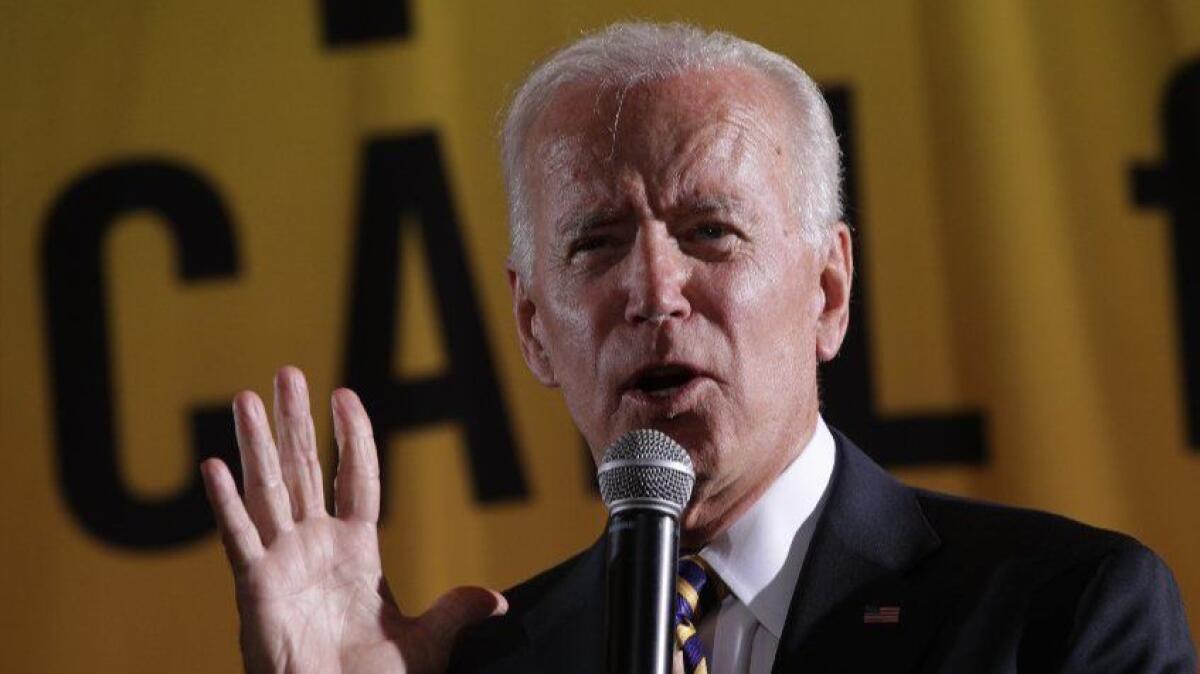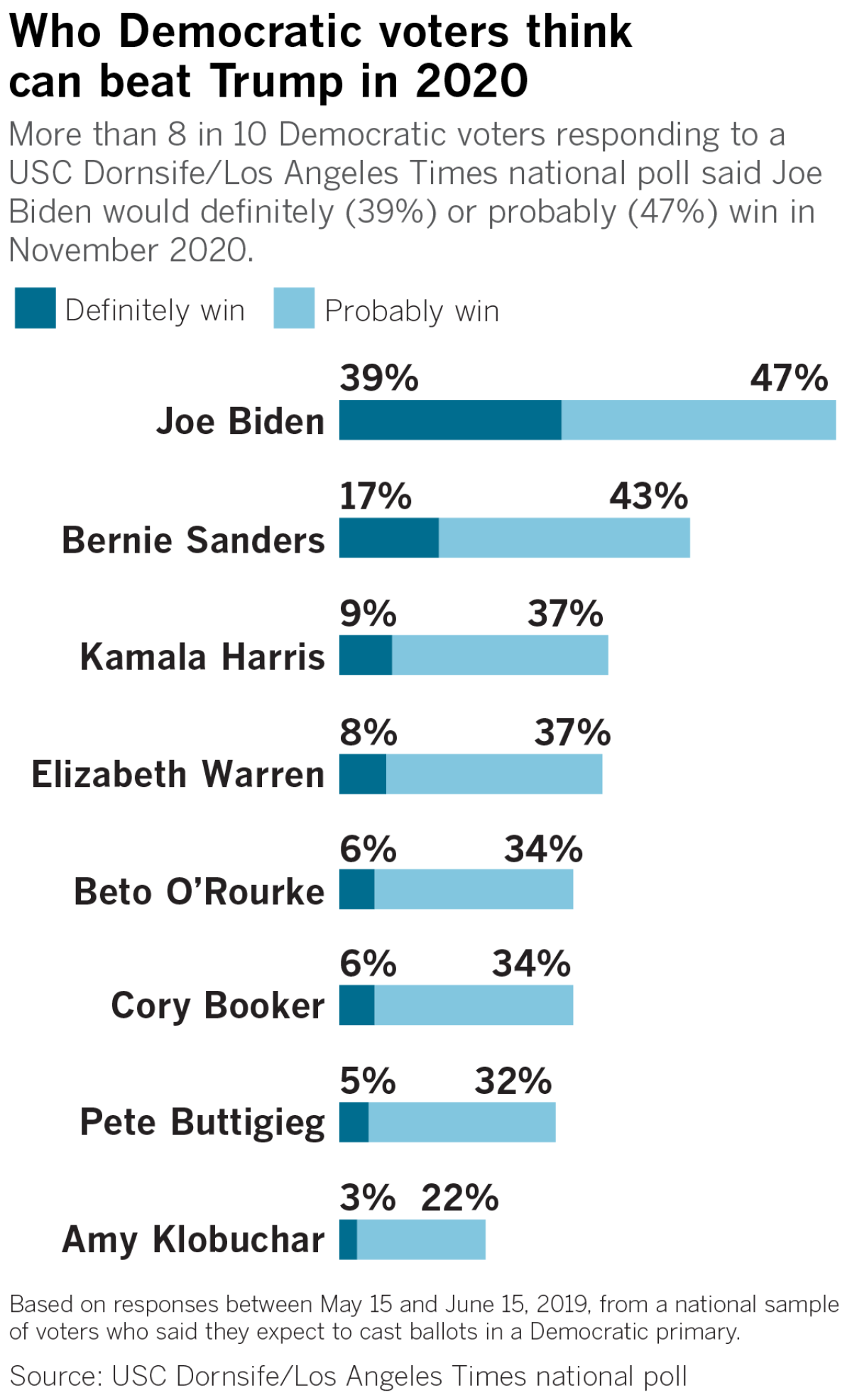This poll asked voters to create their perfect candidate. Democrats picked an older white guy

Reporting from Washington — Diversity is taking a back seat to Democrats’ desire to dump Trump.
The 2020 presidential candidate field is well stocked with women, people of color and millennials, but a majority of voters who said they expected to cast ballots in a Democratic primary thought that candidates who were white, middle-aged and male would be the party’s best bet for defeating President Trump.
That finding from the latest USC Dornsife/Los Angeles Times national poll illustrates the hurdles that female, black and Latino presidential candidates still face despite Democrats’ celebration of diversity in their ranks. The poll also illustrates the wariness — bordering on pessimism — that many Democratic voters continue to show in the aftermath of Trump’s upset victory in 2016.
Asked to describe the ideal candidate to beat Trump, two-thirds of Democratic primary voters said a white candidate had the best chance of winning in 2020; 7 in 10 said a man would have the best shot; and about three-quarters said the strongest candidate against Trump would be age 41-65. A small majority favored a moderate over a more liberal or progressive candidate.
Combined, 56% said they thought their best bet would be a white male candidate, with just over one-third opting for a white male moderate.
Such calculations about “electability” have become a prominent — and controversial — part of the 2020 campaign. The belief on the part of many voters that a white male candidate has the best shot against Trump has buoyed the candidacy of Vice President Joe Biden, who has led in polls this spring. Other candidates, including Sens. Elizabeth Warren of Massachusetts and Kamala Harris of California, have criticized the focus on who is most electable.
“I remember when people said Barack Obama couldn’t be elected,” Warren said at a recent MSNBC town hall. “I remember when people said Donald Trump couldn’t be elected. And here we are.”
Warren, like other candidates lagging behind Biden in polls, has been urging voters to focus on candidates’ leadership qualities and policies, rather than trying to gauge their electability because guessing who can win an election a year away is all but impossible.
California Democratic 2020 presidential primary is a wide-open race, poll finds »
Although voters preferred a middle-age nominee in the abstract, when they were asked about specific candidates, majorities chose the two oldest candidates — Biden, 76, and Sen. Bernie Sanders of Vermont, 77 — as the ones mostly likely to beat Trump. More than 8 in 10 said Biden would definitely (39%) or probably (47%) win in November; 60% said that about Sanders, although only 17% said they thought he would definitely win.
Democratic voters were less optimistic about six other candidates the survey asked about. A majority said Trump probably or definitely would beat Warren, Harris or Sens. Cory Booker of New Jersey and Amy Klobuchar of Minnesota, as well as former U.S. Rep. Beto O’Rourke and Pete Buttigieg, mayor of South Bend, Ind.

Even as Warren has been gaining ground in recent polls, the USC poll found that 55% of Democratic primary voters said Trump would probably (42%) or definitely (13%) beat her. Harris and O’Rourke were given roughly the same odds. Booker, Buttigieg and Klobuchar were judged less likely to win.
Other data in the poll pointed to weaknesses in Trump’s standing that might give any Democratic nominee a good shot at beating him. Asked to choose between the president and an unnamed Democrat, eligible voters chose the Democrat by 51% to 37%.
That’s in line with the weakness Trump has shown in other polls nationally and in key states, such as Pennsylvania, including some done by his own campaign. Much can change, of course, in the nearly 17 months between now and the 2020 election.
Among Republican primary voters, 54% said they would definitely vote for Trump no matter who else was on the GOP primary ballot. The other 46% said they were open to voting for another Republican if a good candidate was on the ballot. That suggests an opening could exist for a primary challenge to Trump, although no well-funded, strong candidate has emerged.
The biggest obstacle to mounting a challenge to Trump may be the strength of the U.S. economy. More than 8 in 10 Republicans said they approved of Trump’s handling of the economy.
Underscoring the leftward tilt of the Democratic primary electorate, the poll found that just 27% of Democratic voters said they identified with the conservative or moderate wings of the party; 40% said they were liberal or progressive; and 10% called themselves democratic socialists. Roughly 1 in 5 said they didn’t think of themselves in such terms.
But as Democratic voters have begun sizing up the 23-candidate field, ideology has seemed less important than the ill-defined concept of a candidate’s electability. Many polls have found that a majority of Democrats say candidates’ policy views matter less than their ability to beat Trump.
“Democrats are terrified by Trump and traumatized by 2016,” said Robert M. Shrum, co-director of the Center for the Political Future at USC, which sponsored the poll. “They are choosing the profile of what appears to be the safest nominee.”
Trump’s big, early lead in Facebook ads deeply worries Democratic strategists »
Analysis of the USC poll’s findings suggests an “element of identity politics is at work” in how voters judge who is electable, said Jill Darling, who directed the survey.
White voters were overwhelmingly more likely to see white candidates as strongest; women were more likely than men to see female candidates as able to beat Trump; a majority of black voters think a black candidate would be best.
Voters who belong to a particular group are more likely to have “a perception that a candidate who is similar to them in race and gender could have a good chance against Trump,” Darling said.
Still, majorities of both genders tended to predict that a white man would be more likely to beat Trump. That’s a reflection of how little attitudes seem to have changed in the years since Obama was elected the first black president of the U.S. and Hillary Clinton became the first woman to win a majority party nomination. The prediction may also reflect the wariness among Democrats that changed attitudes are not enough to beat Trump.
The poll also found that Democratic primary voters had little taste for nominating a political outsider or novice, which could be good news for an old hand like Biden and bad news for a newcomer like Buttigieg. Seven in 10 primary voters said an experienced Washington insider would have the best chance of winning the 2020 election against Trump.
This USC Dornsife/Los Angeles Times poll was conducted May 15 to June 15 among 5,108 eligible voters, including 2,222 Democratic primary voters and 1,973 Republican primary voters.
Respondents were drawn from a probability-based panel maintained by USC Dornsife’s Center for Economic and Social Research for its Understanding America Study. The poll was conducted in partnership with the USC Dornsife Center for the Political Future. Responses were weighted to accurately reflect known demographics of the U.S. population.
The margin of error is 2 percentage points in either direction for all eligible voters, and 3 percentage points for Democratic and Republican primary voters. A full description of the methodology, poll questions and data, and additional information about the poll are posted on the USC website.
More stories from Janet Hook »
More to Read
Get the L.A. Times Politics newsletter
Deeply reported insights into legislation, politics and policy from Sacramento, Washington and beyond. In your inbox three times per week.
You may occasionally receive promotional content from the Los Angeles Times.











